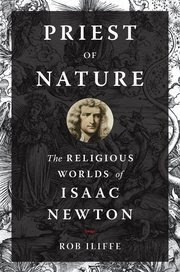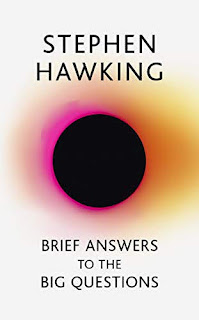Rob Iliffe Priest of Nature - The Religious Worlds of Isaac Newton
‘He vindicated by his philosophy the majesty of God mighty and good, and expressed the simplicity of the Gospel in his manners. Mortals rejoice that there has existed such and so great an ornament of the human race!’ So translates the choir screen monument epitaph adjacent to its graphic globe honouring gravity theorist Isaac Newton (1642-1727) in Westminster Abbey.
Rob Iliffe’s Priest of Nature is a study of ‘the religious worlds of Isaac Newton’ based on documents recently made accessible that reveal the ‘utterly original but obsessively private religion’ of this dominant intellectual figure of his age. Newton was born in 1642, strikingly as the English Civil War started, with an ‘uncommon spirit of liberty’ which eventually came to possess him as a thinker and a Christian pushing at age old authority. His amazing capacity of thought bore fruit in his Principia securing him high postings at Cambridge, the Royal Mint and the Royal Society but his thinking also extended to Christian origins and a ruthless challenging of tradition. Since his death attention to the exact nature of his religious beliefs has been delayed both by dismissal of their significance among his fellow scientists and embarrassment at their heretical elements among his fellow Christians. In a definitive work Oxford’s Professor of History puts the record straight with a biography of Newton that engages with ‘the spiritual views of the man who fundamentally changed how we look at the universe’.
Notebooks from Newton’s youth evidence a personal relationship with God confessing ‘he had not loved God for his goodness’. Iliffe documents the strict religious discipline at Trinity College, Cambridge where he became a fellow in 1656 and Newton’s lifelong adherence to the Church of England, save during its suspension during the Commonwealth. Although he despised Roman Catholics he was critical of Deists at the other end of the Christian spectrum with their dismissal of revealed truth and organised religion. Scripture was vital and vitalising to him and he rejoiced in the availability of the Greek New Testament and bible concordances which set him up to pursue assiduously the history of salvation from Creation to Apocalypse. He did this in as focused a way as he pursued his Optics and Mathematics, rehearsing again and again a conviction that true understanding was only granted by God. ‘As Newton put it, it was difficult for the wise to understand the truths of religion, given that they were so “prepossest” with their own imaginations and too engrossed with worldly designs. Ultimately, true understanding of prophecy was a gift of God; if the wise were to understand, they had to purify themselves from sin before they could accept God’s offer’. Part of this purification he saw, paradoxically, as countering the imagination which he saw as a destructive call towards idolatry, idleness and lust. Though so creative and full of imagination he warns repeatedly against the latter, one of many paradoxes about this great thinker.
Another paradox is that though God, Scripture and the Church were Newton’s prime orbit his religious studies took him away from mainstream Christian belief. Iliffe notes how weak late 16th century Anglicanism was in its Trinitarian apologetic. Newton’s poor formation in that Faith might explain his readiness to identify the Great Apostasy in the book of Revelation with the 4th century work of Athanasius, Anthony and others helping formulate Trinitarian Faith. Though devoted to Christ Newton told one of his contemporaries ‘Christ had reformed, that is, restored the religion of Moses - itself a restoration of those true elements of worship that were embedded within the Egyptian religion’. This ignorance of the unique faith of the Church through the ages may be a result of confusion in lay catechesis flowing from the Reformation with disagreements on ecclesiology having implications for Christology. Newton’s particular pursuit of truth in scripture contrasts though with his peers who were ready to see the prophetic voice of scripture interpreting contemporary events such as the execution of King Charles I, restoration of Charles II, vacation of the throne by James II and ascent to it of William and Mary. Newton’s anti-Catholicism was linked to the extraordinary understanding he had of the 4th not the 17th century, though he successfully stood as MP for Cambridge to counter James II’s promotion of Roman Catholics to lead at his university.
Priest of Nature as a title resonates with an elite concept of the priest as one bearing esoteric knowledge. Newton understood himself as such a priest with his Principia, understood by very few in its day, elite knowledge and he thought the same of his religious writings. Ironically the principle of consensus dear to Catholic truth in which individual contributions melt into ‘what seems good to the Holy Spirit and [the Church]‘ (Acts 15:28) was alien to such a single-minded adventurer. A flaw in his character was a suspicion of misrepresentation, linked to a litigious spirit, seen as a touch of paranoia isolating him from the wider network of thinkers. All the evidence is that his holding back his theological writings from publication was unrelated to their heretical nature but true to that caution evidenced in his scientific work. As his epitaph states Newton with his brilliance and humility was indeed ‘a great ornament of the human race’ but he seemed to know it! The contribution he made to the understanding of light and gravity seems irrevocable but that to theology, through hidden for over two centuries, is unlikely to be proven.
John Twisleton
Rob Iliffe Priest of Nature - The Religious Worlds of Isaac Newton
Oxford 2017 £22.99 ISBN 978-0-19-999535-6 522pp
Rob Iliffe’s Priest of Nature is a study of ‘the religious worlds of Isaac Newton’ based on documents recently made accessible that reveal the ‘utterly original but obsessively private religion’ of this dominant intellectual figure of his age. Newton was born in 1642, strikingly as the English Civil War started, with an ‘uncommon spirit of liberty’ which eventually came to possess him as a thinker and a Christian pushing at age old authority. His amazing capacity of thought bore fruit in his Principia securing him high postings at Cambridge, the Royal Mint and the Royal Society but his thinking also extended to Christian origins and a ruthless challenging of tradition. Since his death attention to the exact nature of his religious beliefs has been delayed both by dismissal of their significance among his fellow scientists and embarrassment at their heretical elements among his fellow Christians. In a definitive work Oxford’s Professor of History puts the record straight with a biography of Newton that engages with ‘the spiritual views of the man who fundamentally changed how we look at the universe’.
Notebooks from Newton’s youth evidence a personal relationship with God confessing ‘he had not loved God for his goodness’. Iliffe documents the strict religious discipline at Trinity College, Cambridge where he became a fellow in 1656 and Newton’s lifelong adherence to the Church of England, save during its suspension during the Commonwealth. Although he despised Roman Catholics he was critical of Deists at the other end of the Christian spectrum with their dismissal of revealed truth and organised religion. Scripture was vital and vitalising to him and he rejoiced in the availability of the Greek New Testament and bible concordances which set him up to pursue assiduously the history of salvation from Creation to Apocalypse. He did this in as focused a way as he pursued his Optics and Mathematics, rehearsing again and again a conviction that true understanding was only granted by God. ‘As Newton put it, it was difficult for the wise to understand the truths of religion, given that they were so “prepossest” with their own imaginations and too engrossed with worldly designs. Ultimately, true understanding of prophecy was a gift of God; if the wise were to understand, they had to purify themselves from sin before they could accept God’s offer’. Part of this purification he saw, paradoxically, as countering the imagination which he saw as a destructive call towards idolatry, idleness and lust. Though so creative and full of imagination he warns repeatedly against the latter, one of many paradoxes about this great thinker.
Another paradox is that though God, Scripture and the Church were Newton’s prime orbit his religious studies took him away from mainstream Christian belief. Iliffe notes how weak late 16th century Anglicanism was in its Trinitarian apologetic. Newton’s poor formation in that Faith might explain his readiness to identify the Great Apostasy in the book of Revelation with the 4th century work of Athanasius, Anthony and others helping formulate Trinitarian Faith. Though devoted to Christ Newton told one of his contemporaries ‘Christ had reformed, that is, restored the religion of Moses - itself a restoration of those true elements of worship that were embedded within the Egyptian religion’. This ignorance of the unique faith of the Church through the ages may be a result of confusion in lay catechesis flowing from the Reformation with disagreements on ecclesiology having implications for Christology. Newton’s particular pursuit of truth in scripture contrasts though with his peers who were ready to see the prophetic voice of scripture interpreting contemporary events such as the execution of King Charles I, restoration of Charles II, vacation of the throne by James II and ascent to it of William and Mary. Newton’s anti-Catholicism was linked to the extraordinary understanding he had of the 4th not the 17th century, though he successfully stood as MP for Cambridge to counter James II’s promotion of Roman Catholics to lead at his university.
Priest of Nature as a title resonates with an elite concept of the priest as one bearing esoteric knowledge. Newton understood himself as such a priest with his Principia, understood by very few in its day, elite knowledge and he thought the same of his religious writings. Ironically the principle of consensus dear to Catholic truth in which individual contributions melt into ‘what seems good to the Holy Spirit and [the Church]‘ (Acts 15:28) was alien to such a single-minded adventurer. A flaw in his character was a suspicion of misrepresentation, linked to a litigious spirit, seen as a touch of paranoia isolating him from the wider network of thinkers. All the evidence is that his holding back his theological writings from publication was unrelated to their heretical nature but true to that caution evidenced in his scientific work. As his epitaph states Newton with his brilliance and humility was indeed ‘a great ornament of the human race’ but he seemed to know it! The contribution he made to the understanding of light and gravity seems irrevocable but that to theology, through hidden for over two centuries, is unlikely to be proven.
John Twisleton
Rob Iliffe Priest of Nature - The Religious Worlds of Isaac Newton
Oxford 2017 £22.99 ISBN 978-0-19-999535-6 522pp




Comments
Post a Comment